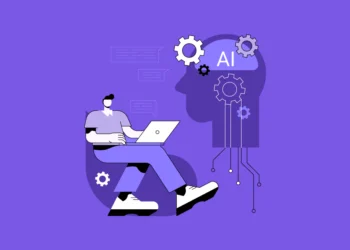Finance has always been a data-powered industry. But recently, the speed and depth of analysis have been limited by human ability. Bankers, analysts, and traders depended on historical trends, market intuition, and periodic reviews. That approach worked in the past, but now markets run in milliseconds, and risks emerge without warning.
AI is changing financial transactions, making them faster, safer, and more efficient. This is expected to save more than $1 trillion in the banking sector annually by 2030. Therefore, let’s see how AI in Finance can help businesses make better decisions.
Top Applications of AI in Finance

Here are some applications of AI in finance.
It enables asset managers to process complex market data in real time, identifying patterns. Hedge Funds like Man Group have integrated AI into their trading strategies. Because this allows them to detect early market changes and adjust positions in seconds.
This step towards a self-looking investment model means that strategies develop dynamically. Because it requires less human intervention while benefiting from expert inspection.
Traditional audits were periodic and often missed out on emerging hazards. AI enables real time transactions and continuous monitoring of market data.
Algorithms can immediately flag off abnormal activity, whether it is about credit card fees or portfolio movements. Therefore, it enables financial institutions to act before the risk increases.
AI goes beyond historical credit scores, incorporating alternative data. Such as payment habits, income patterns, and business activity, to determine creditworthiness. It opens the door for people with limited credit history for startup founders. So, they can access financial products that traditional scoring systems would have denied them.
A survey by Gartner shows 58% of finance functions will be using AI in 2024.
It has probably seen the most visible change. AI-mango-operated systems learn from previous fraud efforts and become more accurate over time. They perform suspicious activity in milliseconds, protect customers, and save billions in annual losses. You can also get AI development services for more aid.
-
Customer-Facing Services
AI is the brain behind intelligent chatbots, financial advice, and predictive banking. Instead of generic account updates, customers can receive proactive recommendations.
For example, alerts about unusual spending, savings opportunities, or investment risks are all delivered in real time.
AI in finance can process billions of data points from global economic indicators and market trends to identify consumer behavior patterns and create actionable insights. This speed and depth of analysis give financial institutions a decisive lead in the highly competitive market.
How AI Is Disrupting the Financial Sector
AI is changing finance. It helps banks work faster, detect fraud, and make smarter decisions.
- At the same time, the market value of AI in Fintech is estimated at $ 44.08 billion with a CAGR of 2.9%, according to Fortune Business Insights.
- About 72% of companies use AI in at least one commercial function.
- 67% of organizations plan to increase spending on technology, especially in data and AI areas.
- In AI Implementation, identity verifications enable banks to save $900 million in operational costs.
- AI-operated chatbots and virtual assistant users help reduce the cost of dealing with inquiries by 80%.
What Are the Benefits of AI in Finance
Below are the key benefits of AI in the finance sector.
1. Unmatched Speed and Accuracy
Financial decisions that once required weeks of review can now be made often with greater precision. As loan approvals can be automated without sacrificing accuracy, enabling banks to serve more users in less time.
2. Proactive Risk Management
Organizations can stop fraud before it happens. This is important because financial markets can change a lot, very quickly.
3. Recommendation Personalization
AI can go beyond balance checks—it understands your expenses, savings, and life events. That allows financial institutions to tailor products and services in multiple ways. A student might get a low-interest education loan offer just as they start applying to universities. While a frequent traveler might receive a personalized credit card promotion that rewards airline miles.
4. Cost Efficiency
It’s another big help. It takes care of boring tasks like typing data, making reports, and answering common questions automatically. The conversational AI platform reduces the need for manual intervention and increases interaction. This not only cuts costs but also frees up human employees to focus on complex, high-value tasks.
5. Regulatory Compliance
Finally, AI in finance enhances and reduces human error and keeps institutions updated with rules. In regulated industries like banking and insurance, it avoids costly fines and reputational damage.
Which Industries are Benefiting the Most?
Here is how every sector gets benefits from AI capabilities.
-
Banking
It is at the forefront. Retail, commercial, and investment banks are leveraging AI. From fraud detection and loan processing to automated investment advice. RPA handles back-office workflows, while predictive analytics improves user retention strategies.
-
Investment
These firms have also embraced AI with open arms. High-frequency trading algorithms, powered by ML, execute in seconds. So, these firms also use AI-driven market analysis to generate higher returns with reduced risk exposure.
-
Insurance
It is another prominent winner. AI in finance enables insurers to correctly assess the risk, customize premiums, and speed up the processing of claims. Fraud detection systems identify suspicious claims before they are paid, saving millions. Once the process is taken once in the process, it can be approved in days or hours.
-
Debt Recovery
These businesses are reaping benefits. AI helps segment debtors based on repayment, allowing for more targeted recovery strategies. So, it preserves customer relationships while improving repayment rates.
Read also: Top 10 Most Popular AI Business Models in 2025
The Future of AI in Finance
AI for Financial Services is moving from experimental adoption to a new era of strategic requirement. In the coming years, the AI systems will explain it transparently and create confidence among users. The advanced AI in NLP will allow AI to explain complex financial documents and global market events. It empowers institutions with accuracy to make unprecedented decisions. We will also look at the rise of colleagues’ AI ecosystem.
Therefore, banks, insurers, and investment firms safely share data to detect fraud and increase compliance capabilities. As algorithm bias becomes a growing concern, it would be important to address it to meet moral obligations. Eventually, AI will develop from being a differential for a fundamental requirement. Organizations that fail to embed AI deeply into their processes will struggle to compete with technology-powered rivals.
- Advanced NLP – Real-time Interpretation of complex financial data and news events.
- Associate ecosystems – safe data sharing to strengthen fraud and risk models.
- Prejudice mitigation – removing discriminatory patterns for fairness and compliance.
Conclusion
AI is no longer an experimental tool in finance. It is an essential component of modern strategy, from revolutionizing investment management to personalizing everyday banking. Technology will handle speed, scale, and data complexity, while humans will continue to evolve.
FAQ
How can fintech benefit from AI?
Algorithmic trading, fraud detection, credit scoring, and chat-based customer service are all applications of AI in fintech. It aids in risk model optimization, financial advice personalization, and automated loan approvals.
Will AI replace fintech?
Therefore, Fintech businesses and others can benefit greatly from investing in AI. This is the voice of our leading industry figures. Businesses can also benefit from investing in AI, but it needs strong digital support.
What impact does AI have on finance?
Five broad areas are where artificial intelligence (AI) in finance might be helpful: automate processes and cut costs; control risk and fraud; create opportunities; personalize services and products; and enable transparency and compliance.
What impact will AI have on fintech?
AI will significantly improve the speed, intelligence, and personalization of financial services. Through automation, it will lower operating expenses and enhance real-time fraud and risk detection. Financial assistants and conversational banking are two further ways that GenAI will change user experiences.
What does artificial intelligence’s future hold?
AI is predicted to enhance sectors including manufacturing, healthcare, and customer service, resulting in better experiences for both employees and clients. It does, however, confront difficulties such as heightened regulation, issues over data privacy, and employment losses.

















